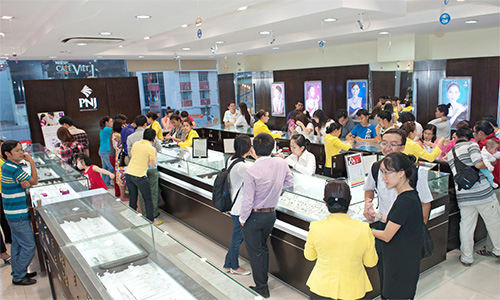Foreign consultants keep PNJ a step ahead

Since transitioning to a market economy in 1986, Vietnam has seen considerable socio-economic achievements, but many local companies are still inexperienced in terms of pushing their businesses to ever-greater levels of success.
Phu Nhuan Jewelry (PNJ) is a typical example of one such firm overcoming these obstacles. It is now Vietnam’s largest jewelry company with one-third share of the domestic gold market. It has a fully-integrated operation that encompasses sourcing raw materials, designing finished products, manufacturing by skilled artisans, wholesaling and retailing..
PNJ has an excellent growth outlook, as it has steadily developed its distribution and production chains. It currently has more than 170 retail stores and is looking to expand this to 300 by 2017. Today, PNJ’s business model is similar to that of Tiffany’s in that it designs, produces, and then sells products via its own stores.
Nguyen Thi Cuc, deputy general director of PNJ, attributed the firm’s successful growth to the determination of the board of directors in taking advantage of consulting services provided by international firms. These services have helped PNJ to gain experience and skills in advanced management throughout the production and sales processes, and in terms of developing human resources.
PNJ was first founded in 1988 as Phu Nhuan Jewelry Trading Store with an initial investment of VND14 million (equivalent to a mere 9 ounces of gold at the time) and a staff of only 20 employees.
Two years later it became Phu Nhuan Jewelry, Fine Arts and Currency Exchange Company, which operated under the direct control of the Finance Department under the Ho Chi Minh City People’s Committee. In 1992 it assumed its current name, or PNJ for short. This time witnessed tremendous changes to the firm, resulting from the board of director’s bold decision to invest in Italian production line technology. In the same year, the company also co-founded Dong A Bank and formed a joint venture with Phu Nhuan House Trading and Development Company.
“From our first days we have enlisted the help of foreign consulting firms to advise on our business strategies and to learn the best practices from them” said Cuc, who cited that 25 years ago PNJ hired a group of Japanese consultants to help develop its first jewelry production facility in Ho Chi Minh City.
“For 25 years, effectively using consulting services for best practices have helped PNJ cement its leading position in the jewelry market,” she affirmed.
In 2011, the company worked with its Italian consultant Value Partners Management Consulting in developing its long-term strategy, setting up the firm’s business goals, and coming up with plans to become the leading jewelries manufacturer and retailer in Asia and maintain its number one position in its target segments in Vietnam.
In 2012 PNJ signed an agreement with Cowan, an international brand and packaging design agency, to rebrand the firm in a way that aligned with its business objectives and aspirations.
Accordingly, Cowan worked closely with the firm’s CEO and other key executives to identify the values and attributes of the organisation.
PNJ also has agreements with Hay Group and the former senior vice president of Zales Corp, Sterling Pope, for consulting on its human resources, information technology and retail chain.
“If a company is aware and understands exactly what its goals are, using foreign consulting services is a major advantages,” said Cuc.
She attributed the firm’s successful business results in 2013 to the use of foreign consulting services. During that time, PNJ’s core jewelry business performed extremely well with after-tax profits (deducting financial income) up 45 per cent on-year thanks to the implementation of best practices in operations and improved retail management.
This trend is continuing in 2014, as evidenced by an on-year increase of 58 per cent in after-tax profits from its core business as of April 2014. This is well on-track for the goal of 45 per cent for the entire year.
In fact, many Vietnamese firms have failed in their application of foreign consulting services. This begs the question: how are local firms positioned to follow the advice offered by such consultancies?
“Being open-minded and authentic is a shared culture from top management to every staff in PNJ. We must look directly into our strengths and weaknesses and then look for solutions with experts’ inputs,” Cuc said.
At PNJ, to successfully implement the direction defined by foreign consulting firms all staff and leaders had to be aware of essential changes, she added.
She noted that the company has over 1,500 employees, but that they unify together for common goals without focusing on individual benefit. “That is the foundation needed for any change to be successful.”
What the stars mean:
★ Poor ★ ★ Promising ★★★ Good ★★★★ Very good ★★★★★ Exceptional
Latest News
More News
- State corporations poised to drive 2026 growth (February 03, 2026 | 13:58)
- Why high-tech talent will define Vietnam’s growth (February 02, 2026 | 10:47)
- FMCG resilience amid varying storms (February 02, 2026 | 10:00)
- Customs reforms strengthen business confidence, support trade growth (February 01, 2026 | 08:20)
- Vietnam and US to launch sixth trade negotiation round (January 30, 2026 | 15:19)
- Digital publishing emerges as key growth driver in Vietnam (January 30, 2026 | 10:59)
- EVN signs key contract for Tri An hydropower expansion (January 30, 2026 | 10:57)
- Vietnam to lead trade growth in ASEAN (January 29, 2026 | 15:08)
- Carlsberg Vietnam delivers Lunar New Year support in central region (January 28, 2026 | 17:19)
- TikTok penalised $35,000 in Vietnam for consumer protection violations (January 28, 2026 | 17:15)
















 Mobile Version
Mobile Version